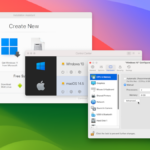Addressing the demographic divide in AI comfort levels

Today, 37 percent of respondents said their companies were fully prepared to implement AI, but looking out on the horizon, a large majority (86 percent) of respondents said that their AI initiatives would be ready by 2027.
In a recent Riverbed survey of 1,200 business leaders across the globe, 6 in 10 organizations (59 percent) feel positive about their AI initiatives, while only 4 percent are worried. But all is not rosy. Senior business leaders believe there is a generational gap in the comfort level of using AI. When asked who they thought was MOST comfortable using AI, they said Gen Z (52 percent), followed by Millennials (39 percent), Gen X (8 percent) and Baby Boomers (1 percent).
Scratch that! We’re actually no wiser about when Microsoft plans to release the Windows 11 24H2 update

For those who are keenly awaiting the release of the Windows 11 24H2 update, a recent Microsoft blog post caused a good deal of excitement. It appeared to reveal that this significant feature update is due to roll out this very month; but all was not as it seems
Microsoft has now updated the blog post to clarify that the information it includes has been misinterpreted -- or perhaps that it was not sufficiently clearly written in the first place. Where does this leave us?
Microsoft reveals the imminent release date for Windows 11 24H2

If you have been wondering just when you’ll be able to get your hands on the final version of the Windows 11 24H2 update, wonder no more.
Although Microsoft has not made a big announcement about the release date for this eagerly anticipated feature update for Windows 11, the company has -- seemingly inadvertently -- revealed the release schedule in a blog post. This spills the news that the release of Windows 11 24H2 is just days away.
Why businesses can't go it alone over the EU AI Act

When the European Commission proposed the first EU regulatory framework for AI in April 2021, few would have imagined the speed at which such systems would evolve over the next three years. Indeed, according to the 2024 Stanford AI Index, in the past 12 months alone, chatbots have gone from scoring around 30-40 percent on the Graduate-Level Google-Proof Q&A Benchmark (GPQA) test, to 60 percent. That means chatbots have gone from scoring only marginally better than would be expected by randomly guessing answers, to being nearly as good as the average PhD scholar.
The benefits of such technology are almost limitless, but so are the ethical, practical, and security concerns. The landmark EU AI Act (EUAIA) legislation was adopted in March this year in an effort to overcome these concerns, by ensuring that any systems used in the European Union are safe, transparent, and non-discriminatory. It provides a framework for establishing:
Meta is training its AI using an entire nation’s data… with no opt-out

The question of how to train and improve AI tools is one that triggers fierce debate, and this is something that has come into sharp focus as It becomes clear just how Meta is teaching its own artificial intelligence.
The social media giant is -- perhaps unsurprisingly to many -- using data scrapped from Facebook and Instagram posts, but only in Australia. Why Australia? Unlike Europe where General Data Protection Regulation (GDPR) necessitated Meta to give users a way to opt out of having their data used in this way, Australia has not been afforded this same opportunity. What does this mean?
How will AI change the future of software development teams?

AI is revolutionizing the landscape of software development, but it isn’t about replacing human developers. Instead, we are entering an era of “AI-augmented development,” where AI tools are becoming invaluable allies, enhancing human abilities across the software lifecycle. AI will help close the gap between the high demand for custom software and the limited engineering capacity worldwide.
In this new paradigm, AI is stepping in to assist with repetitive and time-consuming tasks, allowing developers to focus on more complex problems. The evolution of software teams will include a new breed of AI-native developers specializing in integrating AI into applications and leveraging AI tools. With AI, the potential productivity boost for developers is extraordinary, allowing them to work faster and smarter. However, while AI can amplify a developer's capabilities, it cannot replace the human creativity, problem-solving, and decision-making that are essential to successful software development. The future belongs to teams that can skillfully blend AI with human expertise.
Save $23! Get 'Generative AI in Practice: 100+ Amazing Ways Generative Artificial Intelligence is Changing Business and Society' for FREE

Generative AI is rewriting the rulebook with its seemingly endless capabilities, from crafting intricate industrial designs, writing computer code, and producing mesmerizing synthetic voices to composing enchanting music and innovating genetic breakthroughs.
In Generative AI in Practice, renowned futurist Bernard Marr offers readers a deep dive into the captivating universe of GenAI. This comprehensive guide introduces you to the basics of this groundbreaking technology and outlines the profound impact that GenAI will have on business and society. Professionals, technophiles, and anyone with an interest in the future will need to understand how GenAI is set to redefine jobs, revolutionize business, and question the foundations everything we do.
The magic of RAG is in the retrieval

Any leading large language model will do. To succeed with retrieval-augmented generation, focus on optimizing the retrieval model and ensuring high-quality data.
The decades-long pursuit to capture, organize and apply the collective knowledge within an enterprise has failed time and again because available software tools were incapable of understanding the noisy unstructured data that comprises the vast majority of the enterprise knowledge base. Until now. Large language models (LLMs) that power generative AI tools excel at processing and understanding unstructured data, making them ideal for powering enterprise knowledge management systems.
Parallels Desktop 20 offers free AI-ready virtual machines for seamless experimentation and deployment of AI tools

Alludo has announced the release of Parallels Desktop 20.0 for Mac. Available in Standard, Pro, Business and -- new to version 20 -- Enterprise editions, the virtualization software makes it easy for Mac users to run Windows, macOS and Linux virtual machines on their desktop.
Version 20’s headline new feature is the Parallels AI Package add-on for Business, Enterprise and -- until the end of the year -- Pro users running Macs with Silicon hardware. This provides access to AI-ready virtual machines to aid in development.
Is your network future-proofed for the age of AI?

The internet was a massive, revolutionary invention. A once-in-a-lifetime breakthrough. And yet, it was not an overnight sensation in terms of consumer adoption. This may surprise some people today. From the early web browsers in 1992 to the explosion of dot-coms in 1998, it took roughly six years for the general public to truly embrace the world wide web. Fast forward to today, and the landscape has dramatically shifted.
Consider the recent phenomenon of ChatGPT, the large language model chatbot launched by OpenAI in late 2022. Within a year, consumer adoption of this AI technology reached a fever pitch. For a while, it was all anyone in tech and business circles could talk about. In fact, they still are. This highlights a critical difference in our current technological era, which is that innovation is happening and being adopted at an unprecedented pace.
The importance of preparing data for AI integration

Despite the importance and timely arrival of the EU AI Act, there remain some major compliance concerns and the impact it will have on AI adoption and governance strategies. In fact, a recent survey found that having the proper AI governance in place is a top priority for 41 percent of business decision-makers. However, around one-quarter of UK firms have yet to make preparations for AI, and this is partly due to lingering confusion over their obligations.
Yet, the requirements set out by the Act are specific, particularly for “businesses or public authorities that develop or use AI applications that constitute a high risk for the safety or fundamental rights of citizens.” This high-risk category can include anything from law enforcement and employment systems to those used by life sciences and critical infrastructure organizations.
Cheapfakes and deepfakes -- How to spot them

In recent weeks, the term ‘cheapfake’ has shot to the forefront of our national consciousness. Cheapfakes -- and their equally disruptive counterpart, deepfakes -- are becoming much more prevalent today, with the volume of this misleading content estimated to be doubling online every six months. That’s why the world’s leading search engines, social media networks and content publishers are taking notice. In recent weeks, Google announced a far-reaching plan to reduce the discoverability of deepfakes in their search rankings.
Luckily, you don’t need the resources of Google to spot altered media. Here, we’ll examine the primary differences between cheapfakes and deepfakes as well as the AI-based tools that can be used to decisively detect them.
Microsoft's AI research mimics the human brain: Should we be terrified?

Microsoft is delving into the depths of human brain function, trying to replicate its most complex processes in artificial intelligence. While this might sound like progress, it raises a chilling question: Are we on the brink of creating an AI that could outthink and overpower its creators?
In collaboration with top universities, Microsoft Research Asia is spearheading projects that mimic the brain's intricate neural networks. CircuitNet, one such project, isn't just another AI -- it’s a system designed to think like a human. By replicating the brain's connectivity patterns, CircuitNet could potentially surpass current AI capabilities, processing information with an efficiency and accuracy that traditional systems can’t match.
The dawn of the AI-enabled intern

On paper, artificial intelligence makes for the perfect intern -- it’s keen to please, happy to do anything thrown its way, and gets on with tasks so efficiently. It’s also prone to making mistakes. And like a human intern, AI tools need training and monitoring rather than being catapulted straight into senior positions -- it is extremely well suited to the repetitive and predictable tasks that we often ask junior staff to handle.
Unlike people, AI works 24/7, never stresses out -- it can complete a vast number of tasks in a short period of time. This makes it ideal for the mundane jobs that people tend to find boring and time-consuming. Take a function such as VAT ledger data analysis, which can contain millions of rows of data -- for a human to correctly analyze every row would not only take an age but would also be mind-numbingly boring. By contrast, AI can examine it in seconds -- think of it as an ‘infinite intern’.
Remembering the human factor in AI -- Why businesses should focus on workflows, not just applications

An Office for National Statistics (ONS) report shows that one in three UK workers now believe AI could take their job. This concern has been intensified by narratives that overlook AI’s success in collaborating with humans. In reality, the most effective AI applications have been those that serve as assistants to employees, enhancing their role and maximizing their productivity, rather than replacing them.
Businesses undoubtedly understand the potential AI has to boost the productivity of employees, with more than three in every four organizations either using or exploring the use of AI. However, employers are equally unaware of the complexity of their employees’ workflows. A recent WalkMe report shows that enterprise leaders believe their business is using an average of 21 applications each week. The true number is 211, with more than 20 percent of those being AI applications.
Recent Headlines
Most Commented Stories
Windows 12.1 is everything Windows 11 should be -- and the Microsoft operating system we need!
Apple Intelligence will launch in beta and that’s unacceptable for a trillion-dollar company
© 1998-2024 BetaNews, Inc. All Rights Reserved. Privacy Policy - Cookie Policy.